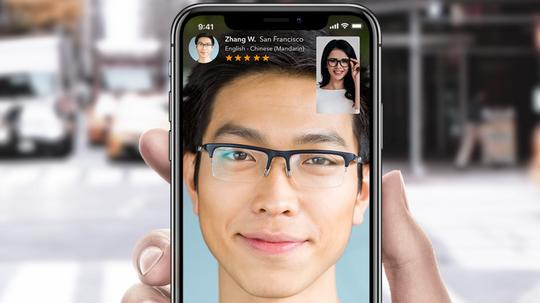
As the COVID-19 pandemic continues to uproot daily life and force people to distance themselves from one another, you’ve probably noticed the surge in popularity of video conferencing services like Zoom, which are making it easier to work and socialize remotely. Along the same vein, a D.C.-based app is presenting itself as a solution for those needing live interpretation services.
Jeenie is a peer-to-peer language interpretation app with a gig economy model. Users can request to video-conference with a live interpreter in a number of languages any time of day. It works with interpreters from more than 100 countries and is available in Chinese, French, German, Italian, Japanese, Korean, Portugese and Spanish. It’s also the only service of its kind providing live American Sign Language interpretation.
Last week, Jeenie was the winner of the “Startup Of The Year” competition hosted by the tech consultancy Established. Originally planned as an event at SXSW—the annual technology and culture festival, which was canceled due to coronavirus concerns—the competition was livestreamed with each participant pitching their startup remotely.
"Their use cases went way beyond health care – using our interpreters in almost every aspect of daily life..."
“Think of us as Uber or Lyft, but for language, health and cultural advice. With just the tap of a button on our mobile app, we connect you to on-demand qualified interpreters on the screen of your mobile device, wherever you are, at any time of day. These are humans, not machines,” Baker said via the livestream.
In light of the pressure that the COVID-19 pandemic has put on the health care system recently, Baker says Jeenie's usage has shot up by 30 percent over the past week.
“With social distancing, in-person interpreting is becoming riskier and more expensive. ... While in-person interpreting is absolutely the most effective form of interpreting, with COVID-19, it presents a risk to the interpreter and to the customer,” Baker told DC Inno in an email. "We are hearing from patients and healthcare providers that the need for coronavirus consultations is driving a lot more interpreting need, especially for limited English proficiency and deaf patients."
Later this spring, Jeenie plans to launch a three-way calling feature, Baker said, responding to increased demand for telehealth capability among app users and health care providers.
Jeenie first launched in January 2019 and was targeted to travelers who needed help communicating with locals or to get cultural advice. From there, Baker says, new use cases for the app kept piling on. People began using the app to practice their language skills and communicate with domestic staff with limited English proficiency. Soon, health care emerged as a critical use case.
“Using Jeenie in doctor practices and clinics right now, we are reducing misdiagnoses and mistreatments. We're also increasing patient health literacy and satisfaction. All of these contribute to saving patients, their healthcare providers and their insurance companies billions of dollars a year, and more importantly, saving lives,” Baker said in the pitch competition.
Baker said all of Jeenie’s interpreters are trained to comply with HIPAA, the law that governs patient information privacy.
Additionally, since ASL launched as an option earlier this year, deaf and hearing-impaired users have been using the app to go about their daily lives.
“Their use cases went way beyond health care – using our interpreters in almost every aspect of daily life from shopping, to ordering at restaurants, buying computers and phones, coordinating with real estate agents, meeting with banks, lunches with friends, family gatherings, and a lot of use in the workplace,” Baker said.
Jeenie boasts that a user can be connected to a live interpreter in under a minute. The app charges a $1 per-minute fee, with some discount packages if users buy minutes in bulk. The app also offers enterprise subscription models. The interpreters earn half the revenue the app makes from each minute.
The nature of the COVID-19 pandemic—which has forced people around the world to practice social distancing in an effort to slow the spread of the virus—has also had an affect on Jeenie’s base of language service providers, Baker said. The interpreters, who are contractors that may work other jobs, are more often at home. As a result, they may be missing out on other work opportunities, but they’re generally more available to work on the app.
“Many of our interpreters who work a few hours here and there for Jeenie while working other jobs, are now at home and quarantined—at best with more time on their hands and a desire to help others … at worst with the inability to earn other necessary income,” Baker said.




